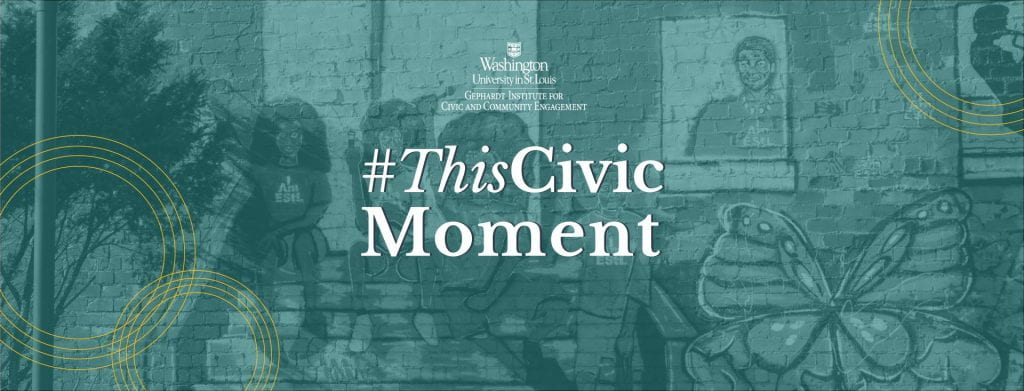Background
The foundation of civic and community engagement is in reflection and reflexivity – a process of thinking about critical incidents that help us to learn, grow, and deepen our civic commitments. In the spirit of reflexivity, the Gephardt Institute for Civic and Community Engagement began a new initiative this summer called This Civic Moment. Initially, the COVID-19 pandemic was the impetus of this series given its impact on our daily lives and its enduring civic implications. The pandemic was the opportunity for a reflective pause to consider how we should collectively act. In the midst of the pandemic, we also see how other civic moments – the movement for Black lives and racial justice, Census 2020, Election 2020, and others – also inspire reflective pauses and collective action.
Program Overview
On a rolling basis, This Civic Moment invites submissions from Washington University students, faculty, staff, and alumni to share their perspectives on the civic moments and implications of these moments through essays, poems, video or audio recordings, or images to offer reflections and implications. This Civic Moment is another strategy to uplift the diversity of perspectives and contributions of the WashU community. The initiative is intended to expand beyond the personal to the broader implications of this moment, with a focus on civic life and civic engagement. This Civic Moment inspires the WashU community to examine issues related to the collective good, the role of citizens and civic leaders, and the fundamental challenges facing civil society during this time of drastic change. Through This Civic Moment, the WashU community is compelled to both contemplate and contribute to the civic health of their communities, in St. Louis and beyond.
Submissions Highlight
One of the first submissions the Gephardt Institute received was from alumna Charlyn Moss ‘20 who composed a poem called “Spare Me the Mask.”
- If a piece of fabric could
- provide my grief’s plea,
- I’d layer cloth over my skin
- before I saw my own face.
- If a sum of bills could
- guarantee our survival,
- I’d offer my own voice
- to sell as your artifact.
- How much would you take
- for my life?

Charlyn shared that her poem was a call to provide a perspective on liberation:
The speaker of this poem struggles with feelings of hopelessness as a result of gross trauma and oppression. Twice, the speaker offers to lose their identity for a life. By the close, the reader must think in the same mode of the speaker…What would you trade for your liberation? The speaker presents these answers simply, yet they’re wholly sacrificial. Trade the identity for life. I wish I could explain each choice here, but mainly I hope any reader will sit with the blunt despair of the speaker and reflect. With high drama, the speaker yearns to be heard.
Charlyn’s use of metaphors – mask, fabric, voice, and grief – captures the integration of civic moments – the COVID-19 pandemic and the calls for racial justice – into one conceptual piece. For your own reflection:
- In what ways do the speaker’s words resonate with you in this poem?
- What does freedom mean to you?
- How does the speaker’s idea of liberation contrast with your own?
Upcoming submissions will provide perspectives that encourage the WashU community to collectively reflect on the civic moments that impact our lives. The Gephardt Institute invites readers to engage with submissions, as well as reflection questions and additional readings that accompany each submission on our website and on social media. Submissions and nominations for submissions are also encouraged. #ThisCivicMoment is designed to be a provocative forum for the campus community to more deeply engage with the civic moments of our time, broaden our perspectives on the civic implications of these moments, and clarify the role that each of us will play in uplifting civic health as we move through these moments and beyond.
Learn more and submit an entry.
Article by Jillian Martin
